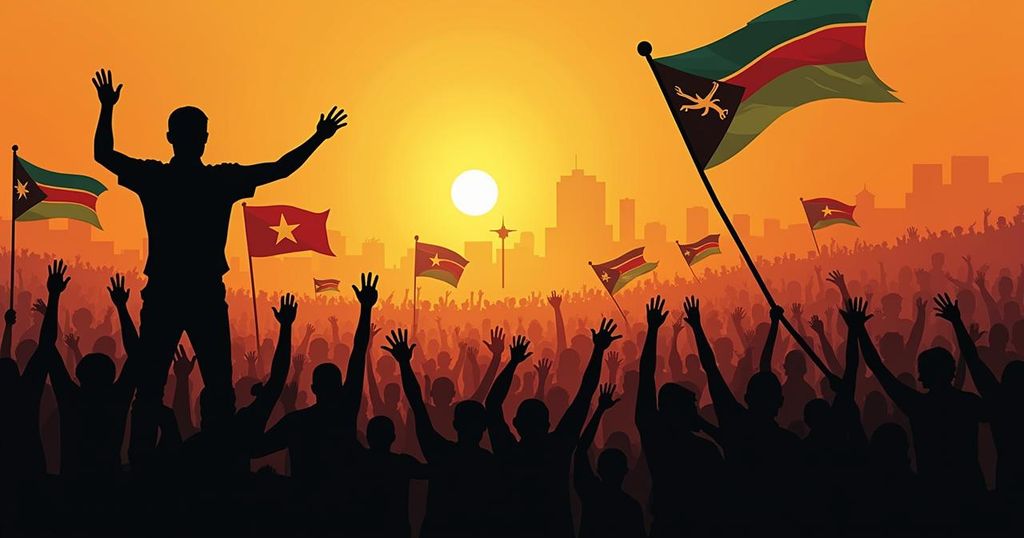In Mozambique, the ruling Frelimo party, led by candidate Daniel Chapo, appears poised for electoral victory as the opposition remains fragmented and less visible. Chapo’s confident claims about Frelimo’s contributions to the country contrast with the subdued campaigns of opposition figures like Ossufo Momade and Lutero Simango, while controversial candidate Venancio Mondlane seeks to inspire younger voters with his populist approach. As elections approach, the National Election Commission reports readiness, although the grip of Frelimo on Mozambican politics seems secure.
In Maputo, the capital city of Mozambique, the political landscape is currently dominated by the ruling party, the Mozambique Liberation Front (Frelimo), whose vibrant red banners have become a recognizable symbol of the election campaign that began on August 24. With almost fifty years of uninterrupted rule since the nation’s independence, Frelimo appears poised to maintain its dominance in the upcoming elections. As President Filipe Nyusi, who has served for a decade, is ineligible to seek reelection due to term limits, Frelimo has put forth a new candidate, Daniel Chapo, the 47-year-old former governor of Inhambane province. Chapo’s image is prominently displayed across various media, similar to the visibility of Frelimo’s traditional red symbols. The opposition parties, while permitted to contest for the parliamentary seats, seem to struggle to make a significant impact. A mere glance at the streets reveals minimal opposition presence, primarily consisting of a few posters featuring their candidates. Chapo, confident in his campaign, has referred to Frelimo as the primary contributor to national progress, declaring, “People go to the hospital, and forget that it was built by Frelimo. They take medicine, and forget that it was imported by Frelimo. And when they feel better, they say Frelimo hasn’t done anything for our country. I call that ingratitude.” Among his challengers, Ossufo Momade of the Mozambican National Resistance (Renamo) is recognized as a leading opposition figure. Despite the support of several smaller parties, his campaign lacks fervor, with criticism emerging from within his own ranks regarding his ambition and overall leadership style. In a similar vein, Lutero Simango of the Democratic Movement of Mozambique (MDM) has sought to highlight the need for political reforms, contending that Mozambique remains under the sway of a single party, yet his efforts have not resonated strongly with the electorate. Venancio Mondlane, although marked as controversial, appeals to younger voters in urban areas with his populist message. His recent separation from Renamo and subsequent formation of a new party was marred by disqualification from parliamentary elections, prompting him to assert, “We will fight, and we will not bow to the established power structures.” As the elections approach, the National Election Commission (CNE) has ensured readiness, acknowledging minor concerns but reassuring the public of its preparation to conduct the electoral process smoothly. With more than 17 million citizens registered to vote, aspirations of a political shift remain high, although the collective expectations signal a likely continuation of Frelimo’s governance through Chapo.
Mozambique’s political framework has been historically dominated by Frelimo, which has maintained governance since the country’s independence in 1975. Recent elections have seen growing scrutiny over the strength of the opposition, which is fragmented and struggles against Frelimo’s established influence. This situation is further complicated by the political strategies and public perception surrounding the candidates, particularly with the new candidacy of Daniel Chapo following the tenure of Filipe Nyusi. Understanding the candidates’ backgrounds, electoral strategies, and the opposition’s challenges is crucial for analyzing the forthcoming election outcomes.
In conclusion, the forthcoming elections in Mozambique reveal a landscape heavily tilted in favor of the ruling Frelimo party, particularly with its new candidate Daniel Chapo projected to succeed Filipe Nyusi. The fragmented opposition, represented by parties struggling to secure visibility and traction, further solidifies Frelimo’s hold on power. Despite efforts by opposition leaders to challenge the status quo, the dominance of Frelimo’s political machinery and messaging suggests a likely continuation of its longstanding governance. As the elections draw near, the electorate’s response to these dynamics will ultimately determine the country’s political trajectory.
Original Source: www.dw.com






